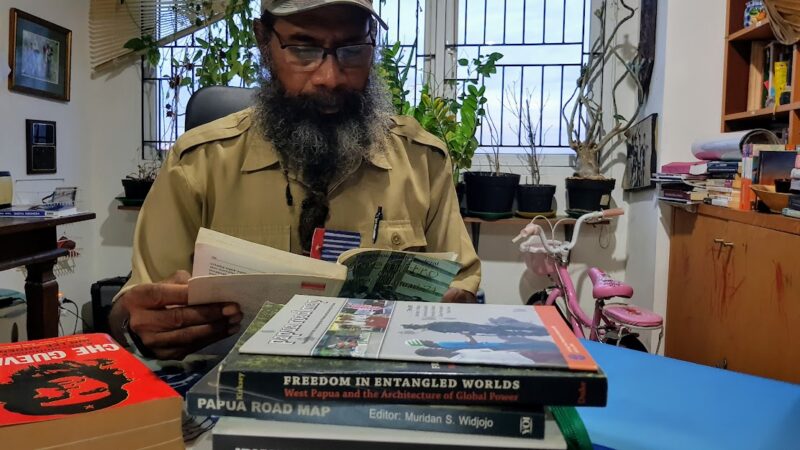
File photo of Filep Karma shared by Indonesian human rights researcher Andreas Harsono, used with permission
Thousands joined the funeral procession in honor of beloved West Papua independence activist Filep Karma, who was found dead on a Jayapura beach on November 1. He was 63. Police said Karma died during a diving trip but local activists are calling for an independent investigation.
Karma is part of the movement for self-determination in West Papua, which is currently a province of Indonesia.
Karma was arrested in July 1998 for organizing a protest on Biak Island while raising the Morning Star flag of West Papua, a banned symbol of independence. He was released after 18 months in jail.
He was arrested again in December 2004 for raising the banned flag and sentenced to 15 years in prison on treason charges. He was released in November 2015 after years of sustained global campaigning calling for his freedom.
“When West Papua is free, I want my name to be erased from the history of West Papuan struggle. This is so my children or grandchildren won't be able to use my name for positions or awards.” – Filep Karma pic.twitter.com/pjxi7uFYDR
— Veronica Koman 許愛茜 (@VeronicaKoman) November 4, 2022
Scholar David Robie summed up the tributes for Karma, who is widely regarded as the “father of the Papuan nation.” Karma was “believed to be the one leader who could pull together the splintered factions seeking self-determination and independence,” wrote Robie.
Andreas Harsono, Indonesia researcher for Human Rights Watch, wrote about Karma’s activism after his release from prison:
After his release, Karma embraced a wider agenda of political activism. He spoke about human rights and environmental protection. He campaigned for the rights of minorities. He organized help for political prisoners’ families.
Karma’s humor, integrity, and moral courage was an inspiration to many people. His death is a huge loss, not only for Papuans, but for many people across Indonesia who have lost a human rights hero.
Benny Wenda, exiled leader of the United Liberation Movement for West Papua, highlighted the heroic role of Karma in the independence struggle:
…a Nobel Peace Prize nominee, and the longest serving peace advocate in an Indonesian jail. But he was first of all a frontline leader, present at every single protest, reassuring and inspiring all West Papuans who marched or prayed with him.
For West Papuans, Filep was equivalent to Mahatma Gandhi, Nelson Mandela, Martin Luther King. The history of our struggle lived within him.
For me, as for all West Papuans, Filep’s struggle continues. His legacy and his dream of freedom lives on in the next generation, who suffer the same systematic discrimination and fight for the same goal.
Wenda also criticized the police for attempting to block Karma’s funeral procession:
How would Indonesians feel if their national hero’s funeral procession was disrupted and disrespected in this way? This response demonstrates the endemic racism at the heart of Indonesia’s occupation Filep spent his life fighting.
Human rights lawyer Veronica Koman wrote that Karma “was the face and guardian of non-violent independence movement. He also led his people to not hate Indonesian people but fight the colonial system.”
She posted several tweets documenting the funeral procession where mourners carried the banned Morning Star flags in honor of Karma.
Thousands shout “Papua: freedom” and other freedom chants along the way during the funeral procession for Filep Karma. pic.twitter.com/xO2AXK7kc1
— Veronica Koman 許愛茜 (@VeronicaKoman) November 2, 2022
Karma's family has said that they do not believe there was any foul play involved in his death.
Meanwhile, Amnesty International in Indonesia is among the groups calling for an investigation. Local activists wanted to know the chronology and circumstances that led to Karma's death since they are doubtful about the supposed diving accident. They have been demanding to know the person or persons who accompanied Karma on the beach.
Rally in front of the police hospital Bhayangkara in Jayapura. The peaceful protest demands full investigation into the death of Filep Karma. https://t.co/qFERDyQW0q
— Febriana Firdaus (@febrofirdaus) November 2, 2022






